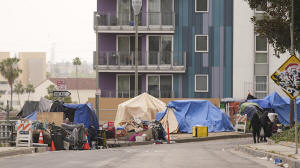Democrats and advocates criticize Trump's executive order on
homelessness
[July 26, 2025]
By JANIE HAR and CHARLOTTE KRAMON
SAN FRANCISCO (AP) — Leading Democrats and advocates for homeless people
are criticizing an executive order President Donald Trump signed this
week aimed at removing people from the streets, possibly by committing
them for mental health or drug treatment without their consent.
Trump directed some of his Cabinet heads to prioritize funding to cities
that crack down on open drug use and street camping, with the goal of
making people feel safer. It's not compassionate to do nothing, the
order states.
“Shifting these individuals into long-term institutional settings for
humane treatment is the most proven way to restore public order,” the
order reads.
Homelessness has become a bigger problem in recent years as the cost of
housing increased, especially in states such as California where there
aren't enough homes to meet demand. At the same time, drug addiction and
overdoses have soared with the availability of cheap and potent
fentanyl.
The president's order might be aimed at liberal cities such as San
Francisco, Los Angeles and New York, which Trump views as too lax about
conditions on their streets. But many of the concepts have already been
proposed or tested in California, where Gov. Gavin Newsom and Democratic
mayors have worked for years to get people off the streets and into
treatment.

Last year, the U.S. Supreme Court made it easier for cities to clear
encampments even if the people living in them have nowhere else to go.
Still, advocates say Trump's new order is vague, punitive and won't
effectively end homelessness.
Newsom has directed cities to clean up homeless encampments and he’s
funneled more money into programs to treat addiction and mental health
disorders.
His office said Friday that Trump's order relies on harmful stereotypes
and focuses more on "creating distracting headlines and settling old
scores."
"But, his imitation (even poorly executed) is the highest form of
flattery,” spokesperson Tara Gallegos said in a statement, referring to
the president calling for strategies already in use in California.
San Francisco Mayor Daniel Lurie has also emphasized the importance of
clean and orderly streets in banning homeless people from living in RVs
and urging people to accept the city’s offers of shelter. In Silicon
Valley, San Jose Mayor Matt Mahan recently pushed a policy change that
makes a person eligible for jail if they reject three offers of shelter.
[to top of second column]
|

Tents are set up along a freeway in a homeless encampment, May 12,
2025, in Los Angeles. (AP Photo/Damian Dovarganes, File)

Trump's executive order tasks Attorney General Pam Bondi and the
secretaries for health, housing and transportation to prioritize
grants to states and local governments that enforce bans on open
drug use and street camping.
Devon Kurtz, the public safety policy director at the Cicero
Institute, a conservative policy group that has advocated for
several of the provisions of the executive order, said the
organization is “delighted” by the order.
He acknowledged that California has already been moving to ban
encampments since the Supreme Court's decision. But he said Trump's
order adds teeth to that shift, Kurtz said.
“It's a clear message to these communities that were still sort of
uncomfortable because it was such a big change in policy,” Kurtz
said.
But Steve Berg, chief policy officer at the National Alliance to End
Homelessness, called parts of the order vague. He said the U.S.
abandoned forced institutionalization decades ago because it was too
expensive and raised moral and legal concerns.
“What is problematic about this executive order is not so much that
law enforcement is involved — it’s what it calls on law enforcement
to do, which is to forcibly lock people up,” Berg said. “That’s not
the right approach to dealing with homelessness.”
The mayor of California's most populous city, Los Angeles, is at
odds with the Newsom and Trump administrations on homelessness.
Mayor Karen Bass, a Democrat, opposes punishing sweeps and says the
city has reduced street homelessness by working with homeless people
to get them into shelter or housing.
“Moving people from one street to the next or from the street to
jail and back again will not solve this problem," she said in a
statement.
All contents © copyright 2025 Associated Press. All rights reserved
 |